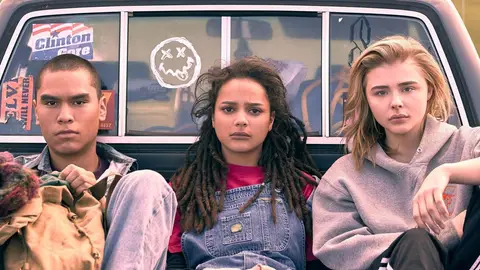Why “The Miseducation of Cameron Post” Director Has Compassion for People Running Conversion Therapy Centers

Iranian-American director Desiree Akhavan is comfortable with her identity as bisexual and came out to her parents at age 25 (although she notes that "'bisexual is kind of a dirty word and makes me deeply uncomfortable—Anne Heche ruined it for us all."), so she's a lot more fortunate than the teenage protagonist of her second feature, The Miseducation Of Cameron Post.
Adapted from Emily M. Danforth's 1990s-set, 470-page YA novel by Akhavan and co-screenwriter/producer Cecilia Frugiuele, the film sees a Montana teen, Cameron (Chloe Grace Moretz), exiled to a religious gay conversion therapy center, God's Promise, run by brother-sister team Dr. Lydia Marsh (Jennifer Ehle) and, an "ex-gay" himself, Reverend Rick (John Gallagher, Jr.). Between exercises designed to root out and purge the source of her queerness, Cameron bonds—and sometimes butts heads—with fellow teens Jane (Sasha Lane), Adam (Forrest Goodluck), and Mark (Owen Campbell).
Having currently written, directed, and starred in a six-episode comedy series in London about a 30-something lesbian who comes out as bi, The Bisexual (airing on Hulu this fall), Akhavan spoke with NewNowNext about the film and whether conversion therapy believer Vice President Mike Pence has seen it yet.
What were the biggest changes you made when adapting the book?
She ages in the book, which spans about five years and starts when she's 12. I always knew that I wanted to focus on the last 200 pages when she's at the gay therapy center. What appealed about the book was the tone—so funny while heartbreaking. At first [Cecilia and I] were very loyal to it scene by scene, but then some scenes became radically different. The events are different, and the structure of the movie. It was about building God's Promise as this weird mix of rehab, jail, and boarding school and so we ended up fabricating a lot of life at God's Promise.
Were you ever in danger of being shipped off to a place like that?
No. Not at all. My family isn't religious, so I've been lucky in that way.
What do you feel towards the people who run gay conversion centers? Anger? Pity?
Compassion. I think they've devoted their lives to children in a really fucked-up, backwards sort of way. Most of them are ex-gay themselves and suffering greatly. When I set about making the movie, we felt that if you left the movie feeling pity and understanding for Rick and Lydia, then we've done our jobs right.
You did well casting Jennifer Ehle, who radiates warmth and kindness in so many of her roles. I don't know we'd feel the same about, say, Catherine Keener, who does evil, inner rot, and malice like a champ!
Jennifer's so lovely, I don't know if you grew up a fan of 1995's Pride And Prejudice TV series, but I did and always thought she was one of the most compelling, elegant, smart women I had seen onscreen. I wanted someone really lovable, and she is.
How has the ex-gay movement changed since its 1990s Exodus International heyday?
I think they've become more covert. They understand the stigma against them and now are seen as 'camps to help reform troubled teens.' A lot use coded language, but they seem pretty similar.
Is the film on Mike Pence's radar, and have you made an offer to set up a screening for him?
I don't have his contact info, but if anyone does, I'd love it. I made this film in a bubble and haven't known anyone touched by it, for better or worse. I live in London and I'm really curious to see what the response is, or if it has any impact on the people who disagree with the morals of the film.
Finally, what is your message or advice for teens worried that they could end up in a place like Cameron does?
I would say reach out to allies and find them however they can. At the same time, the hardest thing about being gay is you have to have some blind faith in yourself to do the wrong thing sometimes. One of the major themes of the film, and it's in every John Hughes teenage film I grew up with, is the adults you grow up with don't know all the answers. You don't necessarily have to blindly follow everything being shoved your throat, and sometimes you have to build your life through yourself and stand behind your own choices, even though it's ugly and hard.





